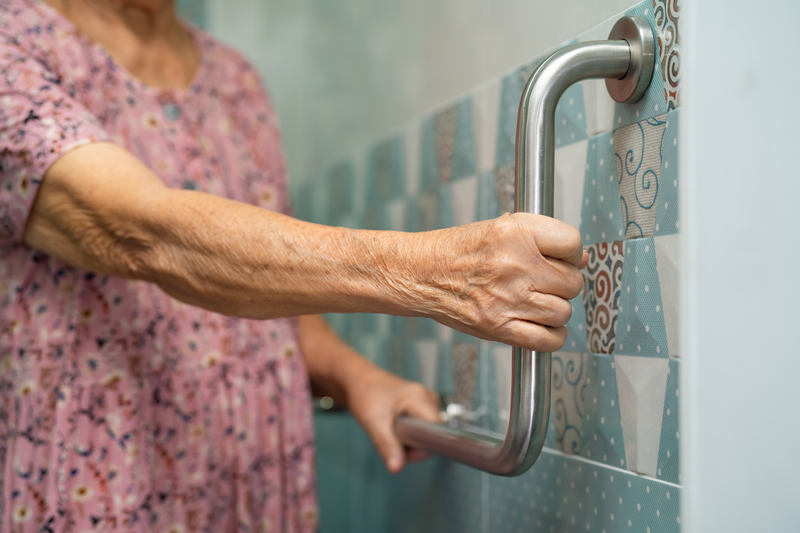Preventing falls
A fall happened quickly. One in three elderly people living at home and half of nursing home residents fall at least once a year.

Here you will find information about:
- Risk factors: what factors cause a fall?
- Consequences : what (serious) consequences are there?
- Precautions : how can you call for help in time?
- Prevention : how can you prevent a fall?
Risk factors
Four factors can cause a fall:
Implications
A fall rarely comes alone. For those who are lucky, it ends with a graze wound. But often the consequences are more serious .
Physical consequences
- Falls usually lead to scratches, bruises or abrasions.
- Sometimes the consequences are more serious , such as head trauma or fractures. More serious physical consequences can lead to hospitalization or permanent disability.
Psychosocial consequences
- The fear of falling (again) has a serious impact on quality of life and sometimes a major impact on social life.
- Those who are afraid of falling move less and therefore lose muscle strength, balance and mobility. The chance of falling then increases.
- In addition, fear of falling also ensures that you go outside less often and therefore participate less in social events. This causes some elderly people to become isolated, lonely or depressed.
Financial consequences
- Expenses resulting from a fall can vary greatly, ranging from the purchase of products (e.g. plasters, disinfectant) to the repair or purchase of objects (e.g. glasses) to the bill for hospital admission or costs for nursing and rehabilitation.
- Any permanent disability may force you to adapt the home or may also mean the loss of income from work .
Staff
With a number of precautions it is easier to call for help in time if you fall.
- Make sure you have a cell phone or a (preferably portable) telephone that you can easily access at all times. Set up useful phone numbers in the address book for any help you need.
- Purchase a personal alarm if you often fall and can no longer reach the phone. This way you can quickly call someone if necessary.
Therapist Kaat explains how to prevent falls
Prevention
There are many things you can do yourself to reduce your risk of falling. The younger you start, the better. But of course you are never too old to learn.
Take care of your feet
Standing firm on your feet is important. That is why it is crucial to have your feet properly cared for and to wear good shoes or slippers.
- Wear footwear that fits well and hugs the entire foot.
- Avoid shoes that are too big or too small, or that are open at the back (flip-flops, slippers).
- Treat immediately wounds and pressure points .
- Always discuss foot problems (e.g. bunions, toe deformities, ingrown nails) with your doctor immediately.
Sufficient exercise
- Keep moving . It strengthens the muscles and improves balance and endurance. Intensive exercise is not necessary. Half an hour of moderately intensive exercise every day already provides you with an important health benefit and reduces the risk of falling. Walking, cycling, gardening and swimming are ideal. Integrating exercise into daily activities as much as possible guarantees that you will last longer.
- Those who have difficulty walking or are unsure of their steps can rely on aids such as a walking stick or a walking frame. Inform yourself about the range available in the Goed Thuiszorgwinkels .
- Do not make sudden movements when standing up from a chair or chair or when getting out of bed. First sit up quietly and wait until all possible dizziness has disappeared. Only then get up slowly and, for example, grip the back of the seat.
- Move quietly when the phone rings or the doorbell rings, or use a cell phone.
- Do regular exercises to improve your balance and muscle strength. Consult a physiotherapist if necessary.
- Don't sit still for too long. Interrupt sitting still regularly (preferably every twenty to thirty minutes) by standing up and walking, getting a glass of water or with another exercise snack.
Medical follow-up
Medicines
Discuss with your doctor the possible side effects of medicines on balance or concentration and always take medicines as prescribed.
- Many medicines can make you sleepy, drowsy or dizzy, disrupt your balance, reduce your reactions and relax your muscles.
- Consult your doctor regularly and contact him if you experience too many side effects.
Eyes
Good vision is essential to avoid falls. Therefore, go to the ophthalmologist immediately if you feel that your eyes are deteriorating.
Have your glasses adjusted if necessary. Do not borrow glasses from others if yours are no longer suitable.
Living environment
- Ensure there is sufficient lighting in all rooms, but especially in the stairwell and between the bedroom and bathroom. Provide automatic lighting with sensor or infrared detector lamps at the exterior doors.
- Do not leave objects lying around on the floor such as books, magazines, crafts. Clean the floor regularly. Dust, crumbs, vegetable scraps can be as dangerous for slipping as water.
- Provide sufficient space to move around everywhere. A passage of 85 cm ensures that you can easily get through everything.
- Avoid laying carpets and use as few mats as possible. If you use:
- then preferably choose mats with anti-slip on the underside;
- place non-slip under loose carpets;
- make sure there are no curling corners.
- Provide stable furniture so that you can safely lean on it if necessary.
- Remove sharp corners with corner protectors , for example on the corners of the coffee table.
Do you have questions about making your home safe? Then ask for professional advice from the free CM service 'Occupational guidance and housing advice'.


